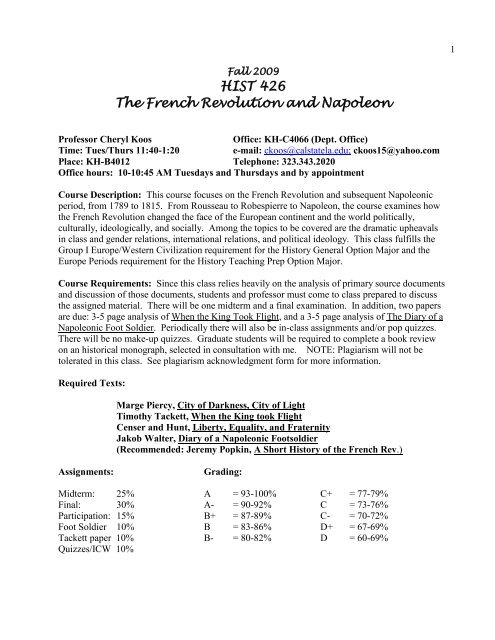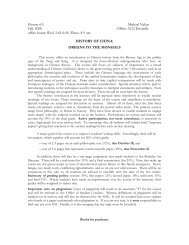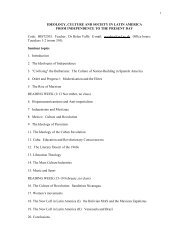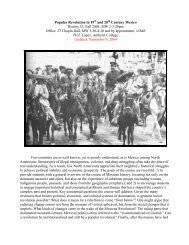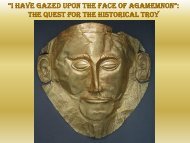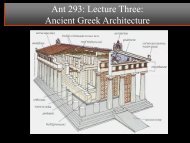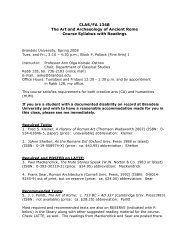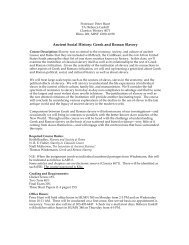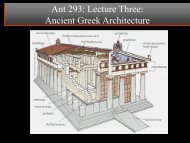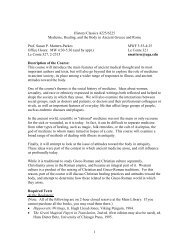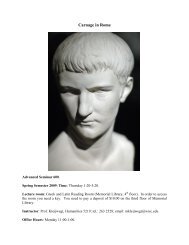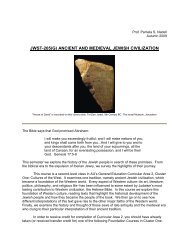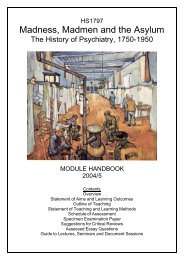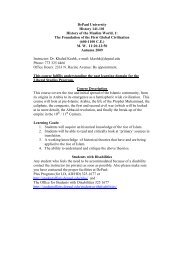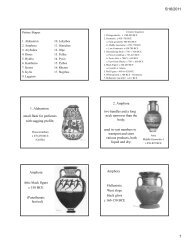HIST 426 The French Revolution and Napoleon
HIST 426 The French Revolution and Napoleon
HIST 426 The French Revolution and Napoleon
You also want an ePaper? Increase the reach of your titles
YUMPU automatically turns print PDFs into web optimized ePapers that Google loves.
Fall 2009<br />
<strong>HIST</strong> <strong>426</strong><br />
<strong>The</strong> <strong>French</strong> <strong>Revolution</strong> <strong>and</strong> <strong>Napoleon</strong><br />
Professor Cheryl Koos Office: KH-C4066 (Dept. Office)<br />
Time: Tues/Thurs 11:40-1:20 e-mail: ckoos@calstatela.edu; ckoos15@yahoo.com<br />
Place: KH-B4012 Telephone: 323.343.2020<br />
Office hours: 10-10:45 AM Tuesdays <strong>and</strong> Thursdays <strong>and</strong> by appointment<br />
Course Description: This course focuses on the <strong>French</strong> <strong>Revolution</strong> <strong>and</strong> subsequent <strong>Napoleon</strong>ic<br />
period, from 1789 to 1815. From Rousseau to Robespierre to <strong>Napoleon</strong>, the course examines how<br />
the <strong>French</strong> <strong>Revolution</strong> changed the face of the European continent <strong>and</strong> the world politically,<br />
culturally, ideologically, <strong>and</strong> socially. Among the topics to be covered are the dramatic upheavals<br />
in class <strong>and</strong> gender relations, international relations, <strong>and</strong> political ideology. This class fulfills the<br />
Group I Europe/Western Civilization requirement for the History General Option Major <strong>and</strong> the<br />
Europe Periods requirement for the History Teaching Prep Option Major.<br />
Course Requirements: Since this class relies heavily on the analysis of primary source documents<br />
<strong>and</strong> discussion of those documents, students <strong>and</strong> professor must come to class prepared to discuss<br />
the assigned material. <strong>The</strong>re will be one midterm <strong>and</strong> a final examination. In addition, two papers<br />
are due: 3-5 page analysis of When the King Took Flight, <strong>and</strong> a 3-5 page analysis of <strong>The</strong> Diary of a<br />
<strong>Napoleon</strong>ic Foot Soldier. Periodically there will also be in-class assignments <strong>and</strong>/or pop quizzes.<br />
<strong>The</strong>re will be no make-up quizzes. Graduate students will be required to complete a book review<br />
on an historical monograph, selected in consultation with me. NOTE: Plagiarism will not be<br />
tolerated in this class. See plagiarism acknowledgment form for more information.<br />
Required Texts:<br />
Marge Piercy, City of Darkness, City of Light<br />
Timothy Tackett, When the King took Flight<br />
Censer <strong>and</strong> Hunt, Liberty, Equality, <strong>and</strong> Fraternity<br />
Jakob Walter, Diary of a <strong>Napoleon</strong>ic Footsoldier<br />
(Recommended: Jeremy Popkin, A Short History of the <strong>French</strong> Rev.)<br />
Assignments: Grading:<br />
Midterm: 25% A = 93-100% C+ = 77-79%<br />
Final: 30% A- = 90-92% C = 73-76%<br />
Participation: 15% B+ = 87-89% C- = 70-72%<br />
Foot Soldier 10% B = 83-86% D+ = 67-69%<br />
Tackett paper 10% B- = 80-82% D = 60-69%<br />
Quizzes/ICW 10%<br />
1
Students with Disabilities: Students with Disabilities should be aware of the resources<br />
available at the Office for Students with Disabilities (Student Affairs 115, telephone:<br />
323.343.3140). Students expecting such accommodations must be registered with OSD <strong>and</strong> have<br />
appropriate paperwork filed.<br />
Late tests <strong>and</strong> papers: Late papers will be docked one letter grade for each day late (B+ to B, for<br />
example). Exceptions will be made only in case of illness, verified by a doctor’s note, or a<br />
verifiable death or serious illness in the immediate family. Tests maybe taken late only under one of<br />
these two circumstances. To receive such accommodation, you must contact me before, not after<br />
the fact.<br />
Attendance <strong>and</strong> Participation: Attendance will be taken at the beginning of each class. Please be<br />
aware that excessive absences (more than four classes (20%)) will place you in jeopardy of failing<br />
the participation portion of your class grade (15% of your overall grade). If you need to arrive late or<br />
leave early for a particular reason, please let me know before the class begins. All class participants<br />
are required to bring the day’s readings (print them out!); your active engagement in class<br />
discussions <strong>and</strong> attentiveness will be factored into your participation grade. Not being prepared or<br />
on time, or contributing to a negative learning environment will impact this portion of your grade<br />
negatively. Please turn off cell phones when entering class; texting is prohibited.<br />
CSU Employee Furloughs – Impact on Classes (CFA Statement)<br />
This year across this campus <strong>and</strong> around the CSU system some class days will be cancelled because<br />
of furloughs. A furlough is m<strong>and</strong>atory un-paid time off; faculty <strong>and</strong> staff on each CSU campus are<br />
being ―furloughed‖ two days per month.<br />
<strong>The</strong>se cancelled class days are marked on the syllabus below. It is important to recognize that these<br />
days off are not holidays. Instead, they are concrete examples of how massive state budget cuts have<br />
consequences for you as students <strong>and</strong> for me as a faculty member.<br />
<strong>The</strong> CSU has suffered chronic under funding for at least 10 years. This year the budget cuts are the<br />
worst in the history of our university system — $584 million or 20% of our budget.<br />
<strong>The</strong> CSU administration is attempting to deal with these cuts with huge increases in student fees<br />
(32%), course reductions, <strong>and</strong> lay-offs of faculty <strong>and</strong> other university employees.<br />
In addition to paying higher fees, students will likely be affected by reduced services <strong>and</strong> classes.<br />
<strong>The</strong> library will have shorter hours. Many campus support services may be decreased or eliminated.<br />
<strong>The</strong>re may be challenges in getting needed signature on forms. Many courses will be cut from the<br />
class schedule or will be full.<br />
If you would like to take action, or simply learn more, I strongly recommend you contact the<br />
California Faculty Association on campus to get connected with other CSULA students who are<br />
working on these issues.<br />
For more information, please contact CFA by email: cfa@cslanet.calstatela.edu or by phone: 323<br />
343 – 5310.<br />
2
Course Schedule ** All Information on this Syllabus is subject to reasonable change.<br />
Please note: Pages for Popkin are tentative, pending receipt of new edition<br />
________________________________________________________________________<br />
Week One:<br />
Week Two:<br />
R 9/24 Introduction: <strong>The</strong> Cast of Characters <strong>and</strong> the Issues<br />
T 9/29 <strong>The</strong> Old Regime <strong>and</strong> the Philosophes: Spotlight on Rousseau<br />
Readings: Piercy, Ch. 1-12<br />
C/H Book: 1-21, Documents 1.1-1.2 (22-3), 1.12 (37)<br />
C/H CD: Text: 4-9; Documents: („Engendering Education‟ Ch 5 (64)<br />
Popkin, Ch. 1<br />
R 10/1 Calling <strong>and</strong> Meeting of the Estates General<br />
Readings: Piercy, Ch. 13-23<br />
C/H Book: 20-21, 50-51<br />
C/H CD: Text: 9-10, Documents: („Petitioning (40)‟, „Sieyes‟ (41))<br />
Popkin, 20-31<br />
Week Three:<br />
T 10/6 Escalation: <strong>The</strong> Bastille <strong>and</strong> the October Days<br />
Readings: Piercy, Ch. 24-28<br />
C/H Book: 51-59, Documents 2.7 (75-79), 1.16 (45-47)<br />
C/H CD: Text: 10-18; Documents („Immolation (41), Marching (72)‟)<br />
Popkin, 31-47<br />
R 10/8 Making a Nation: Forming a Constitution <strong>and</strong> Human Rights Part I:<br />
Who is Included? <strong>The</strong> Poor, Propertied, <strong>and</strong> Jews<br />
Readings: Piercy, Ch. 29-32<br />
C/H Book: 59 (bottom), 1.15 (42-45)<br />
C/H CD: Documents, „Debating Citizenship‟, „Rights Exp<strong>and</strong>ed‟ (42)<br />
Electronic Reserve: Sepinwall, “Defining the Nation” (Human Tradition in<br />
Modern Europe, Granata, Koos, ed.)<br />
Popkin, 47-53<br />
Week Four:<br />
T 10/13 Making a Nation Part II:<br />
Who is Included? <strong>The</strong> Question of Slavery <strong>and</strong> Political Culture<br />
Readings: Piercy, Ch. 32-36<br />
C/H Book: 115-29, Documents 4.1-4.6 (129-138)<br />
C/H CD: Documents „Anti-Slavery‟ (40) „Rights For Slaves‟,<br />
“Powerful Steps”, „Slavery Abolished Temporarily‟ (43)<br />
Popkin, 54-56, 62-63<br />
3
R 10/15 Making a Nation Part III:<br />
Who is Included? <strong>The</strong> Question of Women<br />
Readings: C/H Text: Document 2.8 (79)<br />
C/H CD: Book: 68-74; Documents: „A <strong>Revolution</strong>ary<br />
Dem<strong>and</strong>‟, „We Want Ours‟ (73); „Equality Dem<strong>and</strong>ed‟ (74))<br />
Week Five:<br />
T 10/20 What to do with the King? Summer 1791-92<br />
Readings: Piercy, Ch. 37-53<br />
C/H Book: 62-64<br />
C/H CD: Text: 90-100; Documents: „Flight, Arrest, Return, Outrage‟ (95);<br />
“Marie Antoinette (96)‟, „Monarchy Failing‟ Ends‟ (98) (Tentative)<br />
Popkin, 57-62, 63-72<br />
Assignment due: WHEN THE KING TOOK FLIGHT<br />
R 10/22 <strong>The</strong> Republic <strong>and</strong> the National Convention: Execution of the King <strong>and</strong><br />
Counterrevolution<br />
Readings: Piercy, Ch. 61-66<br />
C/H Book, 64-66<br />
C/H CD: Text: 105-11<br />
Popkin, 73-81<br />
Week Six<br />
Week Seven<br />
T 10/27 Midterm<br />
R 10/29 <strong>The</strong> Terror: "<strong>The</strong> Order of the Day" <strong>and</strong> <strong>Revolution</strong>ary Culture<br />
Readings: Piercy, Ch. 54-60;<br />
C/H Book: 91-95,<br />
C/H CD: Text 111-15, Documents: „Counterrevolution<br />
Emerges (110); „Radical Foundation (111)‟, „Terror in<br />
Action‟ (112),<br />
Popkin, 81-89<br />
T 11/3 <strong>The</strong> Terror <strong>and</strong> <strong>Revolution</strong>ary Culture Part II<br />
Readings C/H Book: Documents 2.5-2.6 (73-75)<br />
C/H CD: Text 111-15, Documents „Time (116)‟<br />
R 11/5 Escalation of the Terror; Masculinization of the Republic<br />
Readings: Piercy, Ch. 67-73<br />
C/H Book: 95-100, Documents: 2.9-10 (81-82);<br />
C/H CD: Text,5:74-80, 6:101-103, Documents: „Marie on Trial‟ (103))<br />
Week Eight<br />
4
T 11/10 Fall 93 –Summer 94: Height of the Terror<br />
Readings: Piercy, Ch. 74-82<br />
C/H Book: Document: 1.4 (24-26), 3.2-3.5 (108-14)<br />
C/H CD: Text, 115-19, Documents „Ultras‟ (113)<br />
Popkin, 89-92<br />
Web Reading: Robespierre: http://www.fordham.edu/halsall/mod/1794robespierre.html<br />
R 11/12 <strong>The</strong>rmidorian Reaction, the Directory <strong>and</strong> the White Terror<br />
Readings: Piercy, Ch. 83-84;<br />
C/H Book: 100-105; Documents 2.11 (83-4), 1.5 (26-7)<br />
C/H CD: Text 120-27<br />
Popkin, 92-108<br />
Week Nine<br />
T 11/17 <strong>The</strong> Rise of <strong>Napoleon</strong>: 1799-1804<br />
Readings: C/H Book: 140-50; Documents 5.1-6 (160-67)<br />
C/H CD: Text : 138-47, Documents: „Steadying France (142)‟,<br />
<strong>Napoleon</strong>ic Law (144)‟<br />
Popkin, 109-122<br />
R 11/19 Imperial Ambitions<br />
Readings: C/H Book: 150-59; Doc 5.7 (167-9)<br />
C/H CD: Text :147-56, Documents “Economic War (150)<br />
Popkin, 122-37<br />
Week Ten<br />
Week Eleven:<br />
Finals Week<br />
T 11/24 Furlough Day: Reading/Writing day for <strong>Napoleon</strong>ic Foot Soldier Paper<br />
R 1126 Thanksgiving Break<br />
T 12/1 <strong>Napoleon</strong>‟s Downfall<br />
Readings: C/H CD:„Moscow Destroyed (152)‟, „Military Defeat (153)‟<br />
Electronic Reserve material: TBA<br />
Paper Due: Diary of a <strong>Napoleon</strong>ic Foot Soldier<br />
R 12/3 Review Discussion: Legacies <strong>and</strong> Interpretations<br />
Readings: C/H Book: 172-186<br />
Popkin, 138-49<br />
Tuesday December 8 FINAL EXAM: 10:45-1:15pm<br />
Graduate Student book review due<br />
5
Week Two:<br />
Web Guide to Censer/Hunt CD-ROM Documents:<br />
http://chnm.gmu.edu/revolution/<br />
(USE Quick Search Function to Locate Document Listed)<br />
T 9/29 <strong>The</strong> Old Regime <strong>and</strong> the Philosophes: Spotlight on Rousseau<br />
CD-ROM Readings:<br />
Rousseau, “Emile” (1762)<br />
R 10/1 Calling <strong>and</strong> Meeting of the Estates General<br />
CD-ROM Readings:<br />
Petition of Women of the Third Estate to the King (1 January 1789)<br />
Sieyès, "What Is the Third Estate?" (1789)<br />
Week Three:<br />
T 10/6 Escalation: <strong>The</strong> Bastille <strong>and</strong> the October Days<br />
CD-ROM Readings:<br />
Decree of the National Assembly Abolishing the Feudal System, 11 August 1789<br />
Stanislas Maillard describes the Women's March to Versailles (5 October 1789)<br />
Women Testify Concerning <strong>The</strong>ir Participation in the October Days (1789)<br />
R 10/8 Making a Nation: Forming a Constitution <strong>and</strong> Human Rights Part I:<br />
Who is Included? <strong>The</strong> Poor, Propertied, <strong>and</strong> Jews<br />
CD-ROM Readings:<br />
Thouret, "Report on the Basis of Political Eligibility" (29 September 1789)<br />
Robespierre, "Speech Denouncing the New Conditions of Eligibility," 22 October 1789<br />
"Petition of the Jews of Paris, Alsace <strong>and</strong> Lorraine to the National Assembly" (28 January 1790)<br />
"Admission of Jews to Rights of Citizenship," 27 September 1791<br />
Week Four<br />
T 10/13 Making a Nation Part II:<br />
Who is Included? <strong>The</strong> Question of Slavery <strong>and</strong> Political Culture<br />
CD-ROM Readings:<br />
Antislavery Agitation: Abbé Raynal, Philosophical <strong>and</strong> Political History of the<br />
Settlements <strong>and</strong> Trade of the Europeans in the East <strong>and</strong> West Indies (1770)<br />
Motion Made by Vincent Ogé the Younger to the Assembly of Colonists, 1789<br />
<strong>The</strong> Abolition of Negro Slavery or Means for Ameliorating <strong>The</strong>ir Lot, 1789<br />
Society of the Friends of Blacks, "Address to the National Assembly in Favor of the<br />
Abolition of the Slave Trade" (5 February 1790)<br />
Decree of the National Convention of 4 February 1794, Abolishing Slavery in all the<br />
Colonies<br />
R 10/15 Making a Nation Part III:<br />
Who is Included? <strong>The</strong> Question of Women<br />
CD-ROM Readings:<br />
Condorcet, "On the Admission of Women to the Rights of Citizenship," July 1790<br />
Women's Petition to the National Assembly<br />
Olympe de Gouges, <strong>The</strong> Declaration of the Rights of Woman (September 1791)<br />
6
Week Five<br />
T 10/20 What to do with the King? Summer 1791-92<br />
CD-ROM Readings:<br />
<strong>The</strong> King Flees Paris (20 June 1791)<br />
<strong>The</strong> Flight to Varennes (21–23 June 1791)<br />
Louis Apologizes (27 June 1791)<br />
Press Reports of the King's Flight: Révolutions de Paris (25 June 1791) <strong>and</strong> Père<br />
Duchesne (1791)<br />
Marie Antoinette's View of the <strong>Revolution</strong> (8 September 1791)<br />
Address of the Commune of Marseilles (27 June 1792)<br />
Parisian Petitions to Dethrone the King (3 August 1792)<br />
<strong>The</strong> Attack on the Tuileries (10 August 1792)<br />
R 10/22 Republic <strong>and</strong> the National Convention: Execution of the King <strong>and</strong><br />
Counterrevolution<br />
CD-ROM Readings:<br />
“War, Terror, <strong>and</strong> Resistance<br />
Week Six<br />
R 10/29 <strong>The</strong> Terror: "<strong>The</strong> Order of the Day" <strong>and</strong> <strong>Revolution</strong>ary Culture<br />
CD-ROM Readings:<br />
<strong>The</strong> Vendée – Description of the Counterrevolution<br />
"Constitution of 1793"<br />
<strong>The</strong> <strong>Revolution</strong>ary Tribunal's Use of the Guillotine<br />
Week Seven<br />
T 11/3 <strong>The</strong> Terror <strong>and</strong> <strong>Revolution</strong>ary Culture Part II<br />
CD ROM Readings:<br />
“War, Terror <strong>and</strong> Resistance: Origins of the Terror”<br />
“<strong>The</strong> Calendar”<br />
R 11/5 Escalation of the Terror; Masculinization of the Republic<br />
CD-ROM Readings:<br />
<strong>The</strong> Queen's Defense (14 October 1793)<br />
Trial of Marie Antoinette of Austria<br />
Week Eight<br />
T 11/10 Fall 93 –Summer 94: Height of the Terror<br />
CD-ROM Readings:<br />
<strong>The</strong> Père Duchesne Supports the Terror (1794)<br />
R 11/12 <strong>The</strong>rmidorian Reaction, the Directory, <strong>and</strong> the White Terror<br />
CD-ROM Readings<br />
“War, Terror, <strong>and</strong> Resistance: Rise <strong>and</strong> Fall of the Factions”<br />
7
Week Nine<br />
T 11/17 <strong>The</strong> Rise of <strong>Napoleon</strong>: 1799-1804<br />
CD-ROM Readings:<br />
Making Peace with the Catholic Church, 1801–2<br />
<strong>The</strong> <strong>French</strong> Civil Code (1804)<br />
R 11/19 Imperial Ambitions<br />
CD-ROM Readings:<br />
“<strong>Napoleon</strong>ic Experience” pp. 138-47<br />
<strong>The</strong> Continental System (1806)<br />
Week Eleven<br />
T 12/1 Downfall of <strong>Napoleon</strong><br />
CD-ROM Readings:<br />
<strong>The</strong> Burning of Moscow as Seen by One of <strong>Napoleon</strong>'s Generals<br />
<strong>The</strong> Battle of Waterloo as Recounted by one of <strong>Napoleon</strong>'s Personal Aides (June 1815)<br />
8
Paper Assignment #1: When the King Took Flight Essay<br />
Due: Tuesday October 20<br />
In a 3-5 page essay (double spaced, st<strong>and</strong>ard one-inch margins, 12 point st<strong>and</strong>ard font), explore the<br />
following question: What is historian Timothy Tackett‟s argument about the significance of King<br />
Louis XIV‟s flight from Paris? To tackle this, you must provide at least three examples FROM<br />
THE BOOK ONLY to support your claims.<br />
Your essay should have an introduction that contains your essay‟s thesis, the body of the essay<br />
should support your thesis, <strong>and</strong> the essay must have a conclusion. You can use parenthetical<br />
references for page numbers (for example: (234)) when you are citing a paraphrased example or a<br />
direct quote. AVOID PLAGIARISM. This is YOUR essay.<br />
Essays are due at the beginning of class, 11:40 am sharp, Tuesday October 20. Papers received<br />
after this time will be penalized one step grade per day.<br />
**************************<br />
Paper Assignment #2: Diary of a <strong>Napoleon</strong>ic Footsoldier<br />
Due Tuesday December 1<br />
In a 3-5 page, double-spaced, typed (double spaced, st<strong>and</strong>ard one-inch margins, 12 point st<strong>and</strong>ard<br />
font) essay, historically analyze Jakob Walters' Diary of a <strong>Napoleon</strong>ic Footsoldier, i.e. write an<br />
essay examining how the diary adds to our knowledge about the <strong>Napoleon</strong>ic Era. Consider some of<br />
the following questions as you write your essay: What does the diary reveal about the experience of<br />
a common man? How did he experience <strong>Napoleon</strong>'s wars? What are his motivations, his goals, his<br />
needs? What does it tell us about the nature of war? How does his experience change over time<br />
from the first campaign in 1806 <strong>and</strong> 1807 to 1812 <strong>and</strong> 1813? How does his experiences compare<br />
with those soldiers who wrote the letters found at the end of the book? What do these collective<br />
experiences tell us about the <strong>Napoleon</strong>ic wars or war in general? How does it compare with<br />
Censer‟s <strong>and</strong> Hunt‟s <strong>and</strong>/or Popkin‟s analysis of the <strong>Napoleon</strong>ic Wars?<br />
You do not need to limit yourselves to these questions <strong>and</strong> you may pick topics that still focus on<br />
the diary as the main point of analysis. As always, your essay must have a thesis/argument,<br />
supporting evidence, <strong>and</strong> a conclusion. You must to cite your sources (using footnotes or endnotes,<br />
using Chicago/Turabian formatting) that you use to construct your argument. AVOID<br />
PLAGIARISM. This is YOUR essay.<br />
This essay will be due at the beginning of class 11:40 am sharp, Tuesday December 1. Papers<br />
received after this time will be penalized one step grade per day.<br />
9
CSULA Plagiarism Policy<br />
Note: <strong>The</strong> following is a reproduction of California State University, Los Angeles' plagiarism<br />
policy as found in the 2009-11 General Catalog, p. 775, 762-763<br />
Plagiarism is a direct violation of intellectual <strong>and</strong> academic honesty. While it exists in many forms,<br />
all plagiarisms refer to the same act: representing somebody else's words or ideas as one's own. <strong>The</strong><br />
most extreme forms of plagiarism are a paper written by another person, a paper obtained from a<br />
commercial source, or a paper made up of passages copied word for word without acknowledgment.<br />
But paraphrasing authors' ideas or quoting even limited portions of their texts without proper<br />
citation is also an act of plagiarism. Even putting someone else's ideas into one's own words without<br />
acknowledgment may be plagiarism. In any of its forms, plagiarism cannot be tolerated in an<br />
academic community. It may constitute grounds for a failing grade, probation, suspension, or<br />
expulsion.<br />
One distinctive mark of an educated person is the ability to use language correctly <strong>and</strong> effectively to<br />
express ideas. Faculty assign written work for the purpose of helping students achieve that mark.<br />
Each professor will outline specific desiderata, but all expect every student to present work that<br />
represents the student's underst<strong>and</strong>ing of the subject in the student's own words. It is seldom<br />
expected that student papers will be based entirely or even primarily on original ideas or original<br />
research. <strong>The</strong>refore, to incorporate the concepts of others may be appropriate with proper<br />
acknowledgment of the sources; <strong>and</strong> to quote others directly by means of quotation marks <strong>and</strong><br />
acknowledgments is proper. However, if a paper consists entirely of quotations <strong>and</strong> citations, the<br />
paper should be rewritten to show the student's own underst<strong>and</strong>ing <strong>and</strong> expressive ability. <strong>The</strong><br />
purpose of the written assignment (i.e. development of communication <strong>and</strong> analytic skills) should<br />
be kept in mind as each paper is prepared. It should not be evaded through plagiarism.<br />
At Cal State L. A., plagiarism is defined as the act of using ideas, words, or work of another person<br />
or persons as if they were one's own,<br />
without giving proper credit to the original sources.<br />
<strong>The</strong> following examples of plagiarism are intended to be representative, but not all-inclusive:<br />
· Failing to give credit via proper citations for others' ideas <strong>and</strong> concepts, data <strong>and</strong> information,<br />
statements <strong>and</strong> phrases, <strong>and</strong>/or<br />
interpretations <strong>and</strong> conclusions<br />
· Failing to use quotation marks when quoting directly from another, whether it be a paragraph, a<br />
sentence, or a part thereof<br />
· Paraphrasing the expressions of thought by others without appropriate quotation marks or<br />
attribution<br />
· Assembling parts from various works <strong>and</strong> submitting the synthesis or single paper as one's own<br />
creation<br />
· Representing another's artistic/scholarly works, such as musical compositions, computer<br />
programs, photographs, paintings,<br />
drawings, sculptures, or similar works as one's own<br />
Continued on next page<br />
10
Academic Consequences:<br />
Faculty have the right to establish the st<strong>and</strong>ards by which the academic performance of students will<br />
be evaluated, including the consequences of students not meeting some portion or all of the<br />
academic requirements of a course through acts of cheating, plagiarism, misrepresentation or<br />
collusion. <strong>The</strong>se consequences may include but are not limited to assigning a lowered grade, zero or<br />
"F" on an individual assignment, or lowering the student's grade or assigning an "F" in the course.<br />
Faculty may alternatively permit the student to repeat an assignment/test or complete <strong>and</strong> submit<br />
additional assignments. Furthermore, before these consequences can be effected, the faculty<br />
member must have verified instances of academic dishonesty by personal observation <strong>and</strong>/or<br />
documentation. In such cases, if a student denies the charges, an instructor shall not assign a grade<br />
until the case is resolved or impose any other negative consequences. In all cases the violation<br />
should be reported to the University Judicial Affairs Officer using the Academic Dishonesty<br />
Allegation form.<br />
**************************<br />
You are permitted to use the ideas of other people; in fact, you should. But, when you use an idea<br />
of someone else without giving the original originator of the idea credit, then that is plagiarism.<br />
For example: if you paraphrase a source, you must give credit to the author. If you take a quotation<br />
word for word, then you must use quotation marks <strong>and</strong> cite the original author. To avoid<br />
unintentional plagiarism, do not share your rough drafts of finished papers with other students. You<br />
have the responsibility to ensure that your work is not used by other students. Also, if you are<br />
taking notes on a publication, be sure to use quotation marks when you are copying a quotation<br />
directly, so you will not forget <strong>and</strong> later think that your notes are already paraphrased.<br />
<strong>The</strong> instructor is not remotely sympathetic to any form of plagiarism, whether intentional or<br />
accidental. Plagiarists are penalized to the maximum extent allowed by Cal State L.A.. Depending<br />
on the extent of the plagiarism, it may result in a failing grade in an assignment, the reduction of the<br />
course grade by one letter grade (without possibility for withdrawal), a failing grade in the course<br />
(without possibility of withdrawal), suspension from the University, or dismissal from the<br />
University. <strong>The</strong>se penalties apply to cheating, collusion, <strong>and</strong> other dishonest conduct; due to the<br />
nature of this class, however, plagiarism is a particularly sensitive topic, <strong>and</strong> has been discussed<br />
here at length.<br />
I acknowledge that I have read <strong>and</strong> underst<strong>and</strong> the above statement, <strong>and</strong> have received a copy of it.<br />
Name (Printed <strong>and</strong> Signed) Date<br />
11


